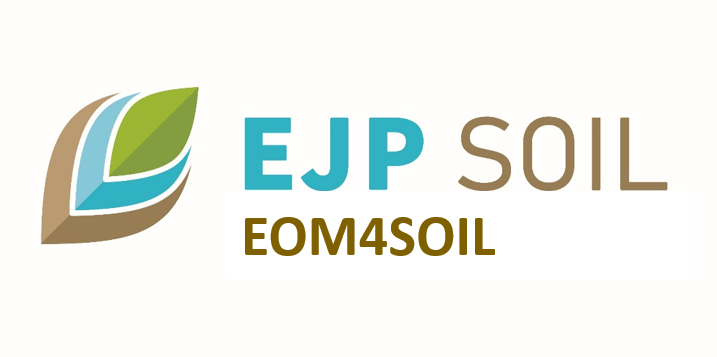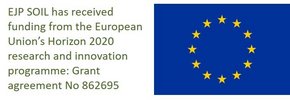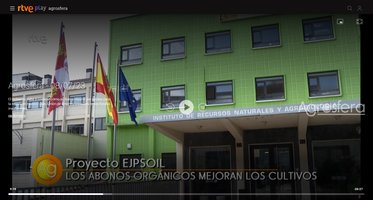EOM4SOIL
| Start: | 1 November 2021 |
| Duration: | 36 Months |
| Aim: | Propose best management practices of external organic matter (EOM) pre-processing and application on soil to contribute to climate change mitigation and improve soil health. |
| Keywords: | External organic matter, process, recycling, arable crops, vineyards, management strategies, C storage, gas emission, fertilizer substitution, contaminants, scenarios of use. |
| Contact: | Project coordinator: Sabine Houot, INRAE (sabine.houot@inrae.fr) Project communication representative: Tobias Bolscher (tobias.bolscher@inrae.fr) |

In the framework of the EOM4SOIL project, CREA-PB researchers, asked to the visitors of the agricultural fair Fieragricola 2024, held in Verona (Italy): “Do you know what’s biochar?”. Farmers, farmers’ associations, agriculture enthusiasts, agricultural mechanics and floriculturists answered to the question. And they all answered “No”.
Biochar is an agricultural amendment. It is the by-product of pyrolysis and gasification processes that produce energy from biomass. In Italy, biochar is studied since 20 years in agricultural research, but it is not yet known by farmers who are supposed to use it in the field. EOM4SOIL preject is working also to spread biochar knowledge among final users.
EOM4SOIL aims at proposing best management practices of external organic matter (EOM) pre-processing and application on soil to contribute to climate change mitigation and improve soil health. Representative farming systems in Europe (arable crops and vineyards) are selected, taking into account the diversity of pedoclimatic conditions. The net budget of soil C storage and greenhouse gas emission including the pre-process step and field application, is assessed as well as the multiple effects of EOM application on soils including contaminants are quantified. Innovative pre-processing are recommended to improve C budget and soil health. The best management practices are defined from scenarios of use assessed with a multicriteria simulation tool, parameterized from long-term experiments.
Background
Many activities generate organic wastes, including housing and urban activities (e.g. biowastes, sewage sludges and green wastes), industries and agriculture (e.g. manures and fruit surplus). Manures have been traditionally returned to soils, but this is not the case for biowastes, such as food wastes and greenwastes, or industrial wastes.
Yet, only 40% of biowastes in Europe is processed through treatments such as composting or anaerobic digestion. Besides recycling on soils, other uses of organic wastes are developing such as
(i) anaerobic digestion, encouraged to produce renewable energy by the European Directive REDII , or
(ii) production of valuable molecules through the development of biorefinery.
In this way, the wastes become ressources, changing the economy around their handling. Even with these new and inovative way to handle the organic wastes, at the end of most processes, some organic residues remain which can be returned to the soils.
The development of anaerobic digestion and renewable energy production also concerns agricultural wastes such as manures but also crop productions, because energy crops, specific crop materials or cover crops are used as input in anaerobic digesters. Such pre-processing before soil application changes the characteristics of the treated organic matter, compared to the intial ressources, and even special treatments have been developed to produce more efficient organic soil amendments.
To give an example, composting stabilise organic matter, producing amendments with additional fertilising properties. Biochars production has been also encouraged at the European level to produce organic amendments with high potential of C storage in soils.
External organic matters (EOM) entering the soils will be defined as:
- Organic matters from external activities (e.g. household wastes) which where not produced on the field where they are applied or
- Organic matter which may have been produced on the same field (e.g. crop residues or cover crops), but have undergone a transformation process before application on soils (e.g. anaerobic digestion).
TVE (08/07/2023). In Spanish - Click here
Agrosfera (EJP SOIL and EOM4SOIL contributes from minute 9.25).
Report on the EJP Soil 'EOM4SOIL' project, with researchers Sonia Rodríguez Cruz and Jesús Marín Benito.
Articles about results from EOM4SOIL
- Layla M. San-Emeterio, Lorena M. Zavala, Nicasio T. Jiménez-Morillo, Ignacio M. Pérez-Ramos, and José A. González-Pérez. Effects of Climate Change on Soil Organic Matter C and H Isotope Composition in a Mediterranean Savannah (Dehesa): An Assessment Using Py-CSIA. 2023. Environmental Science & Technology 2023 57 (37), 13851-13862.

